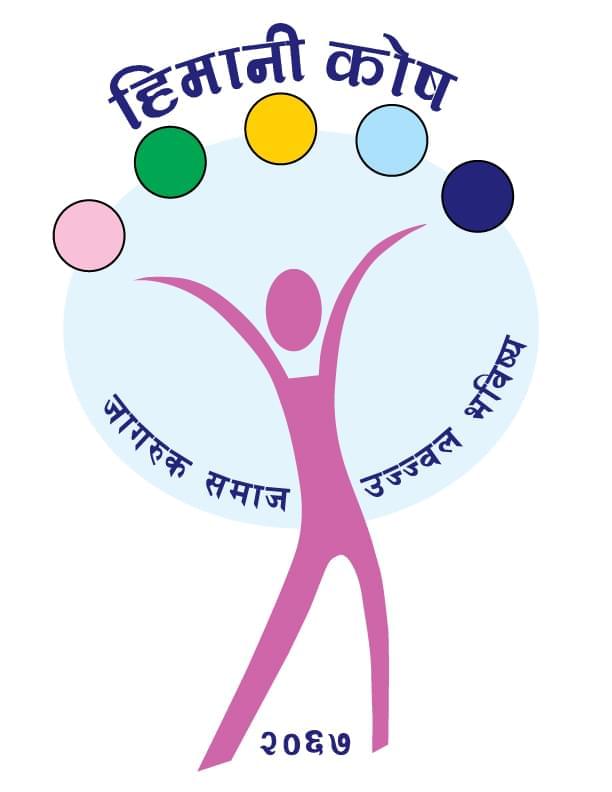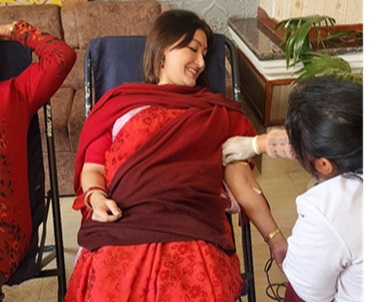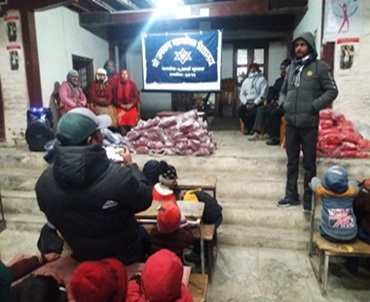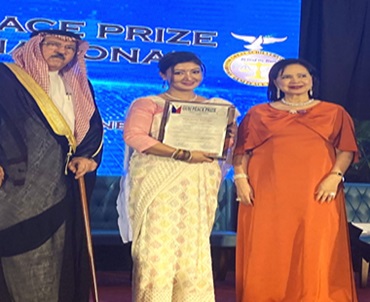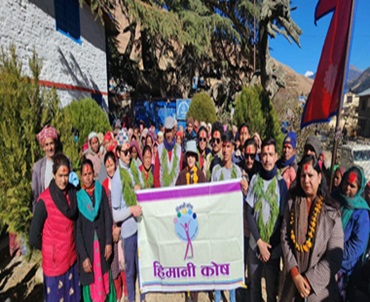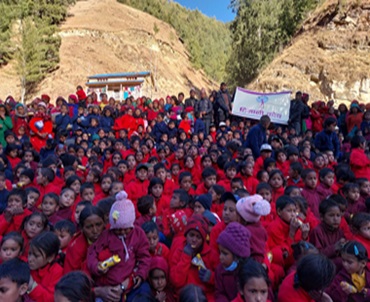Welcome to non profit charity platform
Himani Trust - A non profit organization
Self-filtration water bottle for children
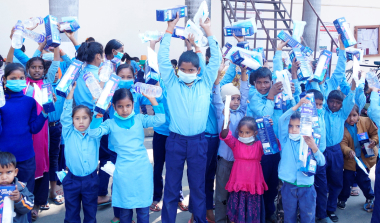
Self-filtration water bottle for children
Self-purifying water bottles for Children
We envision supporting limited privileged children with self-filtering water bottles that can filter about 700 ml of water with its innovative filtration system. Contaminated water from any region of the Himalayan nation can get filtered in these self-filtration bottles; producers claim the bottles are capable of ridding approximately 99% of bacteria. These bottles can filter up to 1000 liters of water before they reach their EOL (End of Life), implying that a school student can use one of these wonder bottles for an entire year and later can replace the filtration for further reuse.
Background
Nepal has 11 million youths under 18 years of age, and an estimated 70% of these children come from low-income families. These families are unable to fulfill their basic needs or have access to clean and safe drinking water.
The importance of clean drinking water becomes evident when the UN, under its Sustainable Development Goals (SDG), mentions it as the 6.1 target goal.
It is stunning to review that as many as 3,500 Nepali children die annually due to water-borne diseases or simply because of inaccessibility to clean water and sanitation. From the Himalayan foothills to the Terai plains, Nepali children continue to suffer from a lack of access to clean water. Schools, especially in higher altitude regions, do not have a regular water supply. On the other hand, people in the Terai region have access to the underground water system, but undrinkable in most cases. In most cases, water supply systems established by the government, as well as non-government organizations are in a dilapidated state.
Limited access to clean drinking water impacts school students in two ways:
Lack of water (dehydration)
Children above 5-12 years of age are expected to drink at least 1.5 liters of water per day. Children from rural areas drink much less water than their growing bodies require, and students in these far-flung areas do not bring their supply of drinking water to school. Neither do school managements consider organizing drinking water as a priority. With this the children get exposed to serious health consequences such as fatigue, headache, and poor endurance of the kidneys, liver, and brain, degrading overall physical growth and contributing to the overall development of the motherland.
Forced to drink polluted water
- The World Health Organization (WHO) documents diseases like cholera, diarrhea, dysentery, hepatitis A, typhoid, and polio as a result of contaminated or unsafe drinking water. The water supply system in Nepal is not entirely reliable when it comes to its quality, and of which most people in urban areas purchase the so-called ‘mineral water’. Sadly, even that often fails the safety standard test.
Solution
Innovation and technology in the form of Self-Filtration Water Bottles support Himani Trust's work towards better health outcomes for hundreds of thousands of disadvantaged Nepali children. With this technological innovation, every child can have access to pure drinking water in their hands – quite literally. This particular solution is encouragingly cost-effective and can be made available to children born to less fortunate parents. Himani Trust, in partnership with prominent community leaders and donor agencies, would like to promote this technology through the length and breadth of this South Asian nation.
Target group
Red Cross Society’s report in 2003 claimed that all Terai districts of Nepal show arsenic contamination in groundwater. World Health Organization (WHO) also tested the same water and concluded that at least one-third of Terai’s water from tube wells is not acceptable for human consumption as it contains arsenic concentrations. Thus, millions of people in the Terai live at risk of arsenic poisoning. The water is also not free from coliform bacteria. This water bottle is the need of every child in Nepal. But, Himani Trust would like to target the children from the Terai region in the first phase. The reason behind children facing flood each year in the Terai region. 90% of people from the Terai belt rely on round water/underwater taken out by tube (or Kal in the local language). Thus, Himani Trust would like to initiate the project from the most flood-impacted areas along with coordination with the local authorities of Terai.
These are the times when people starve for drinkable water. Many people drink flood water during such calamities, hence this self-purifying water bottle can protect the lives of not only the children but also the household. The rest of the time, children can use the regular water available for filtration.
Proposed Activities
To address this deplorable drinking water situation for our school children, Himani Trust proposes the below activities:
Map and identify project areas
Identify beneficiaries and their number
Procure/arrange self-filtration water bottles
Research on promoting entrepreneurship in producing self-filtration bottles in Nepal at a lower cost
Distribute the self-water-filtration bottles
Follow up on executed actions to
(a) gauge the effectiveness thereof and
(b) replace the filtration caps for the target group
नेपाल प्राकृतिक र सम्पदाको हिसाबले धनी मुलुक भईकन आर्थिकरुपमा भने विश्वका अतिविपन्न ४७ औँ मुलुक हो । यहाँका करिब १ करोड दशलाख मानिस १८ बर्षमुनिका बालबालिका छन् । ति मध्ये करिब ७० प्रतिशत बालबालिका अत्यन्तै गरिब पृष्ठभुमिबाट आएका छन् जसको दैनिकी बिहान बेलुकिको छाक टार्नमा सिमित छ । सो वर्गका अधिकांश नेपालीलाई शुद्ध पिउने पानीको समेत अभाव छ । दिगो विकासको लक्ष्यको बुँदा नंबर ६.१ लाई पछ्याउन पनि बालबालिकालाई शुद्ध पिउने पानी उपलब्ध गराउन जरुरी छ । नेपालका विकासे संस्थाहरुले करिब ६५ प्रतिशत नेपालीसँग पानी उपलब्ध छ भन्दछन्, तर ति मध्ये करिब २५ प्रतिशतलाई मात्रै नियमित पानी उपलब्ध छ ।
कम पानी वा फोहोरी पानीका कारण नेपालमा मात्रै बार्षिक करिब ३५ सय बालबालिकाको ज्यान गईरहेको कहालीलाग्दो तथ्यांक छ । कुनै बालबालिका शुद्ध पिउने पानीको अभावमा छन् भने कत्तिपय त पानीको अभावमा दिनभर पानी नखाई बस्ने गरेको पाईन्छ ।
५ देखि १२ बर्षका बालबालिकाले दैनिक कम्तिमा साँडे एक लिटर पानी खान अनिवार्य छ । तर गाउँका बालबालिकाले पानी नै नखाई दिन बिताउन बाध्य छन् । पानीको अभावका कारण छिट्टै गल्ने, टाउको दुख्ने, कलिलैमा मृगौला, कलेजोे र मगजमा खराबी आउछ । पानी पिउन नपाउने अधिकांश नेपाली बालबालिकामा यो खराबी आएको छ । त्यसैगरी कतिपय बालबालिका फोहरी पानी पिउन बाध्य छन् । फोहरी पानीका कारण बालबालिकाहरु सानैमा खतरनाक रोगको शिकार भईरहेका छन् ।
यस समस्यालाई मध्यनजर गर्दै हिमानी कोषले पानी हाल्ने बित्तिकै सफा हुने बोत्तल गाउँ गाउँका बालबालिकालाई वितरण गर्ने लक्ष्य लिएको छ । उक्त बोत्तलमा पानी हालेपछि दुषित किराहरु मर्नेछन् भने फोहरपनि छानीने छ । जसले गर्दा बालबालिकालाई संक्रमणबाट बचाउन सकिन्छ । करिब एक बर्ष टिक्ने उक्त बोत्तलको प्रयोगले बालबालिकामा पानी खाने बानीको विकास हुन्छ ।
बोत्तलका बारेमा जानकारीः
उक्त बोत्तलमा एकपटकमा करिब ७ सय मिलिलिटर पानी अट्दछ । बोत्तलमै फिल्टर र किटाणु मार्ने व्यवस्था छ । बोत्तलमा पानी हाल्ने बित्तिकै पिउन योग्य हुन्छ । बोत्तलको पानीका करिब ९९ प्रतिशत किटाणु मर्नेछन् । करिब १ बर्षसम्म उक्त बोत्तल प्रयोग गर्न सकिन्छ । बोत्तलको कल्याणकारी मुल्य करिब ७ सय नेपाली रुपैया पर्दछ ।
हिमानी कोषले लाखौँ बालबालिकालाई यो बोत्तल मार्फत शुद्ध पिउने पानी पुर्याउने लक्ष्य लिएको छ । यदि तपाईलाई यस योजनामा सहयोग गर्न मन छ भने सहयोग गर्नुहोला ।
नेपाल प्राकृतिक र सम्पदाको हिसाबले धनी मुलुक भईकन आर्थिकरुपमा भने विश्वका अतिविपन्न ४७ औँ मुलुक हो । यहाँका करिब १ करोड दशलाख मानिस १८ बर्षमुनिका बालबालिका छन् । ति मध्ये करिब ७० प्रतिशत बालबालिका अत्यन्तै गरिब पृष्ठभुमिबाट आएका छन् जसको दैनिकी बिहान बेलुकिको छाक टार्नमा सिमित छ । सो वर्गका अधिकांश नेपालीलाई शुद्ध पिउने पानीको समेत अभाव छ । दिगो विकासको लक्ष्यको बुँदा नंबर ६.१ लाई पछ्याउन पनि बालबालिकालाई शुद्ध पिउने पानी उपलब्ध गराउन जरुरी छ । नेपालका विकासे संस्थाहरुले करिब ६५ प्रतिशत नेपालीसँग पानी उपलब्ध छ भन्दछन्, तर ति मध्ये करिब २५ प्रतिशतलाई मात्रै नियमित पानी उपलब्ध छ ।
कम पानी वा फोहोरी पानीका कारण नेपालमा मात्रै बार्षिक करिब ३५ सय बालबालिकाको ज्यान गईरहेको कहालीलाग्दो तथ्यांक छ । कुनै बालबालिका शुद्ध पिउने पानीको अभावमा छन् भने कत्तिपय त पानीको अभावमा दिनभर पानी नखाई बस्ने गरेको पाईन्छ ।
५ देखि १२ बर्षका बालबालिकाले दैनिक कम्तिमा साँडे एक लिटर पानी खान अनिवार्य छ । तर गाउँका बालबालिकाले पानी नै नखाई दिन बिताउन बाध्य छन् । पानीको अभावका कारण छिट्टै गल्ने, टाउको दुख्ने, कलिलैमा मृगौला, कलेजोे र मगजमा खराबी आउछ । पानी पिउन नपाउने अधिकांश नेपाली बालबालिकामा यो खराबी आएको छ । त्यसैगरी कतिपय बालबालिका फोहरी पानी पिउन बाध्य छन् । फोहरी पानीका कारण बालबालिकाहरु सानैमा खतरनाक रोगको शिकार भईरहेका छन् ।
यस समस्यालाई मध्यनजर गर्दै हिमानी कोषले पानी हाल्ने बित्तिकै सफा हुने बोत्तल गाउँ गाउँका बालबालिकालाई वितरण गर्ने लक्ष्य लिएको छ । उक्त बोत्तलमा पानी हालेपछि दुषित किराहरु मर्नेछन् भने फोहरपनि छानीने छ । जसले गर्दा बालबालिकालाई संक्रमणबाट बचाउन सकिन्छ । करिब एक बर्ष टिक्ने उक्त बोत्तलको प्रयोगले बालबालिकामा पानी खाने बानीको विकास हुन्छ ।
बोत्तलका बारेमा जानकारीः
उक्त बोत्तलमा एकपटकमा करिब ७ सय मिलिलिटर पानी अट्दछ । बोत्तलमै फिल्टर र किटाणु मार्ने व्यवस्था छ । बोत्तलमा पानी हाल्ने बित्तिकै पिउन योग्य हुन्छ । बोत्तलको पानीका करिब ९९ प्रतिशत किटाणु मर्नेछन् । करिब १ बर्षसम्म उक्त बोत्तल प्रयोग गर्न सकिन्छ । बोत्तलको कल्याणकारी मुल्य करिब ७ सय नेपाली रुपैया पर्दछ ।
हिमानी कोषले लाखौँ बालबालिकालाई यो बोत्तल मार्फत शुद्ध पिउने पानी पुर्याउने लक्ष्य लिएको छ । यदि तपाईलाई यस योजनामा सहयोग गर्न मन छ भने सहयोग गर्नुहोला ।
Nepal is one of 47 least developed countries of the world, is estimated to have some 11 million youths under the age of 18. An estimated 70% of these children come from financially disadvantaged families who cannot even have their basic needs fulfilled, let alone have access to safe drinking water.
The importance of clean drinking water becomes evident from the fact that the UN, under its Sustainable Development Goals (SDG), mentions it as the 6.1 target goal.
Development agencies maintain that 65% of Nepal’s population has access to sanitation. Even then, only 25% of these systems are operational. It is shocking to see data that indicate that as many as 3,500 Nepali children die annually because of water-borne diseases or simply due to lack of clean water and sanitation.
From the Himalayan foothills to the Terai plains, Nepali children continue to suffer from lack of access to clean water. Schools, especially in the higher altitude regions, do not have a regular water supply. On the other hand, people in the Terai region do have access to the underground water system but it is undrinkable in most cases. Water supply systems established by the government as well as by the non-government sector are in a dilapidated state in most places.
This rather poor access to drinking water affects Nepali school students in two ways:
-
Lack of water (dehydration)
Children above 5-12 years of age are expected to drink at least 1.5-liters of water a day. Although data on the subject is not readily available, it can safely be assumed that children from rural areas drink much less water than their growing bodies require. Students in these far-flung areas do not bring their supply of drinking water to school. Neither do school managements consider organizing drinking water a priority. Even in the USA, a country with comparably the best school management system in the world, it is found that about half of the children are not able to drink the required amount of water. If this lack of drinking water for children continues then there can be serious health consequences such as fatigue, headache and poor endurance of kidneys, liver, and brain. This can also lead to constipation. -
Forced to drink polluted water
The World Health Organization (WHO) maintains that serious diseases like cholera, diarrhea, dysentery, hepatitis A, typhoid, polio, etc are the results of contaminated or unsafe drinking water. The water supply system in Nepal is not entirely reliable when it comes to its quality because of which most people in urban areas purchase the so-called ‘mineral water’. Sadly, even that often fails the safety standard test.
Solution
Innovation and technology in the form of Self-Filtration Water Bottles will help Himani Trust, a philanthropic non-government organization based in Kathmandu, work towards better health outcomes for hundreds of thousands of disadvantaged Nepali children. With this technological innovation, every child can have access to pure drinking water in their hands – quite literally. This particular solution is encouragingly cost-effective and hence, can be easily made available to children borne to less fortunate parents. Himani Trust, in partnership with prominent community leaders and donor agencies, would like to promote this technology through the length and breadth of this South Asian nation.
Self-purifying water bottles
Under the envisioned activities, school children will receive free water-bottles which contain about 700 ml water. These water bottles are fitted with an innovative filtration system. Contaminated water from any region of the Himalayan nation will get filtered in these self-filtration bottles; producers claim the bottles are capable of ridding approximately 99% bacteria. These bottles can filter up to 1000 liters of water before they reach their EOL (End of Life). This implies a school student can use one of these wonder bottles for an entire year following which the filtration cap can be replaced. The cost of these bottles is minimal, i.e., only around 500 rupees per unit (along with the filtration cap).
Target group
Red Cross Society’s report in 2003 claimed that all Terai districts of Nepal have shown arsenic contamination in groundwater. World Health Organization (WHO) also tested the same water and concluded that at least one-third of Terai’s water from tube wells are not acceptable for human consumption as it contains arsenic concentrations. Thus, millions of people in the Terai are living at risk of arsenic poisoning. The water is also not free from coliform bacteria. This water-bottle is the need of every child in Nepal. But, Himani Trust would like to target the children from the Terai region in the first phase. The reason behind that is every year a child faces a flood in some parts of Terai. At that time people will be starving to find at least a drinkable water. Many people drink the flood water which is seriously contaminated. At this time, this self-purifying water bottle can protect the lives of not only the children but also the household. The rest of the time, children can use the regular water available for filtration. 90% of Terai people rely on groundwater/underwater taken out by tube (or Kal in local language). Thus, Himani Trust would like to initiate the project from the most flood-affected local authorities of Terai.
Proposed Activities
In order to address this deplorable drinking water situation for our school children, Himani Trust proposes below activities: Map and identify project areas Identify beneficiaries and their number Procure/arrange self-filtration water bottles Research on promoting entrepreneurship on producing the self-filtration bottles in Nepal at a lower cost Distribute the self-water-filtration bottles Follow up on executed actions to (a) gauge the effectiveness thereof and (b) replace the filtration caps for the target group
